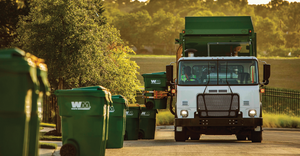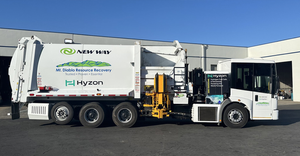Traveling Trash
THE ARRIVAL OF 2006 has brought another chapter in the long-standing effort of Michigan politicians to eliminate the disposal of Canadian trash in the state's landfills. In January, Democrats in the state's House of Representatives announced they will push to place before Michigan voters this fall a proposal that would dramatically increase the state's landfill surcharge. The measure would hike up the fee from 21 cents per ton of landfilled trash to $7.50 per ton.
The corresponding legislation was expected to be introduced by early February. For the proposal to be placed on the November ballot, the legislation would have to be passed by majorities in both the Michigan House and Senate. However, both chambers are controlled by Republicans, who have resisted similar proposed fee increases in the past.
The ballot initiative also would include a moratorium on landfill construction and expansion. It could also contain a provision that would prevent out-of-state jurisdictions from sending solid waste to Michigan if they are caught including items, such as tires, that are banned from the state's landfills in their shipments.
Supporters of the ballot initiative believe that the increased surcharge, which would apply to both solid waste that is generated in and outside of the state, would make Michigan a less likely destination for trash from Canada and other states. “Trash comes to Michigan because it's cheap,” said state Rep. Kathleen Law in a statement supporting the proposed ballot initiative. “Raising the dumping charge will act as a disincentive to dump on the citizens of Michigan.”
John Skinner, executive director and CEO of the Solid Waste Association of North America, Silver Spring, Md., says his organization opposes the fee increase and other components of the proposed ballot initiative because they “would hinder the free movement of interstate waste.”
Also, the higher surcharge “would fall predominantly on the citizens of Michigan,” Skinner says, noting that only a quarter of the solid waste disposed of in the state's landfills comes from outside Michigan. And, if landfill construction and expansion are halted, “disposal costs are going to go up,” he adds.
The National Solid Wastes Management Association (NSWMA), Washington, also opposes the proposed ballot initiative. “NSWMA opposes this tax as an unnecessary burden on Michigan residents and businesses,” says Chaz Miller, state programs director for NSWMA. Referring to shipments of hazardous waste that Michigan sends to Canada, he adds, “If these legislators truly oppose being ‘dumped on,’ then why aren't they trying to stop exports of Michigan's hazardous waste to a Canadian disposal facility?”
Last year, Democrats introduced legislation calling for the same fee increase and landfill moratorium, but the measure would not have placed the issues before voters. Instead, proposals would have become law if approved by the Michigan Legislature and signed by the governor.
The interstate trash issue became a big one in Michigan in 2003, when Toronto began sending its trash to the Carleton Farms landfill in Sumpter Township, Mich. The shipments immediately became unpopular with Michigan politicians and residents, who voice environmental concerns about the solid waste. However, the U.S. Environmental Protection Agency, Washington, has said the shipments present no health concerns, solid waste industry officials point out.
In other interstate waste news, the Ohio Environmental Protection Agency (EPA) recently compiled a report on out-of-state trash coming into the Buckeye State. In 2004, about 14.6 percent — or 3.2 tons — of the trash disposed of in Ohio came from out of state. In 1996, approximately 1.1 million tons of out-of-state trash was disposed of in Ohio, according to the Ohio EPA.
The state exporting the most trash to Ohio in 2004 was New York, with more than 1 million tons. Ohio is the fourth-largest importer of trash, behind Pennsylvania, Virginia and Michigan.
About the Author
You May Also Like




